Discover The Operations Room: A Podcast for COO’s
The Operations Room: A Podcast for COO’s

The Operations Room: A Podcast for COO’s
Author: Bethany Ayers & Brandon Mensinga
Subscribed: 21Played: 540Subscribe
Share
© The Operations Room
Description
We are the COO coaches to help you successfully scale in this new world where efficiency is as important as growth. Remember when valuations were 3-10x ARR and money wasn’t free? We do. Each week we share our experiences and bring in scale up experts and operational leaders to help you navigate both the burning operational issues and the larger existential challenges. Beth Ayers is the former COO of Peak AI, NewVoiceMedia and Codilty and has helped raise over $200m from top funds - Softbank, Bessemer, TCV, MCC, Notion and Oxx. Brandon Mensinga is the former COO of Signal AI and Trint.
This podcast uses the following third-party services for analysis:
Podcorn - https://podcorn.com/privacy
This podcast uses the following third-party services for analysis:
Podcorn - https://podcorn.com/privacy
91 Episodes
Reverse
In this episode we discuss: AI in the future of work. We are joined by Agata Nowicka, Managing Partner of the AI Visionaries Accelerator.Love The Operations Room? Please support us by rating and reviewing it here.We chat about the following with Agata Nowicka: Are high-growth founders underestimating the role of distribution from day one?At Series B and beyond, is your monetisation model actually aligned with value delivery?Could your onboarding and sales process be quietly eroding the value you promise?Will AI fluency soon become a non-negotiable capability in your workforce?Are you building an AI-first company — or just layering AI onto old plumbing?References https://www.linkedin.com/in/agata-nowicka/https://femalefoundry.substack.com/https://www.aivisionaries.co/https://www.femaleinnovationindex.com/Biography Agata Nowicka is the Managing Partner at AI Visionaries—an AI accelerator launched with Google to scale Europe’s most innovative AI and deeptech startups. With 12 years of experience as an angel, VC investor and founder of two tech businesses in the U.S., Hong Kong, and the UK (one exit), she is also the author of the Female Innovation Index—the largest analysis of female-led innovation and funding in Europe. Agata holds an MBA from Wharton and INSEAD and is an advisor to startups and accelerators including Techstars, the University of Cambridge Founders Accelerator, and Village Capital.To learn more about Beth and Brandon or to find out about sponsorship opportunities click here. Summary39:04 – Introduction & Founder Focus Shift42:04 – Monetisation Beyond Revenue45:04 – Sales & Onboarding as Value Proof48:04 – AI Fluency as a Workforce Standard51:04 – Moving to an AI-First Model54:05 – Business Complexity & “Plumbing”48:20 – Resilience in High-Growth Environments49:49 – Leadership in an AI Era57:05 – The Future Belongs to Visionary FoundersThis podcast uses the following third-party services for analysis: Podcorn - https://podcorn.com/privacy
In this episode we discuss: What is the CEO’s job? We are joined by Keith Wallington, Chairperson and Investor in B2B SaaS businessesLove The Operations Room? Please support us by rating and reviewing it here.We chat about the following with Keith Wallington:What actually changes in an operating model as a company scales – and what shouldn’t change, even under pressure?How do you design an organisation that moves fast without creating chaos or decision fatigue?When does adding structure genuinely unlock performance, and when does it quietly slow teams down?How can operators tell the difference between a scaling problem and a leadership problem?What questions should COOs be asking before a Series B or major growth phase to avoid painful rework later?References https://www.linkedin.com/in/keithwallington/Biography Focussed on Series A and Growth stage B2B SaaS businesses that deliver vital, core services to their customers.Keith has led strategy and execution in technology businesses since the 1990’s, driving growth in Europe, the USA and Africa: His experience in driving online business models spans Retail Banking, Telecommunications, Online Live Broadcasting and Software as a Service (SaaS): He has led strategy and execution initiatives at businesses including Microsoft, Standard Bank, Omnicom/TBWA, MTN Group and Mimecast.From 2008 – 2014 Keith spent 6 years driving growth at Mimecast, best in class and global leader in SaaS based email security, archiving and continuity: Here he assumed a number of C Level roles, including COO, spanning most of the business from Marketing to Customer Experience to Technical Operations as he championed scalable, efficient growth during this phase of hyper growth (from $6m to over $110m Annual Recurring Revenue) and global expansion from the UK base.After preparing Mimecast for IPO Keith refocused his attention to support businesses on their growth journey. Keith invests in and assumes board roles with post Series A businesses. He engages directly and also collaborates with Venture Capital and Private Equity teams to co-invest and add depth to portfolio company boards.To learn more about Beth and Brandon or to find out about sponsorship opportunities click here. Summary05:30 – Why operating models break during growth12:45 – The tension between speed and structure19:30 – Horizontal vs vertical operating models26:00 – Decision-making at scale30:00 – What scaling exposes about leadership teams38:30 – Preparing for Series B (before it’s too late)47:00 – Operating principles that actually stick55:30 – Signals your operating model needs a resetThis podcast uses the following third-party services for analysis: Podcorn - https://podcorn.com/privacy
In this episode we discuss: The economics of VC funds. We are joined by Edward Barrow, Co-Founder & CEO @ Cloud Capital.Love The Operations Room? Please support us by rating and reviewing it here.We chat about the following with Edward Barrow:Why do so many fast-growing companies only realise cloud spend is a problem once it’s already out of control?What actually breaks when finance and engineering don’t share a common language around cloud costs?Is “visibility” into cloud spend enough, or does it create a false sense of control?How should operators think about financial risk when infrastructure spend is variable by design?What does good cloud cost governance look like without slowing teams down?References https://www.linkedin.com/in/ebarrow/https://www.cloudcapital.co/Biography Ed has spent his career helping high-growth tech companies align strategy with execution — first in marketing tech, and now in cloud finance.After co-founding Idio, an AI-driven platform used by global B2B brands, he led the business through rapid growth, M&A, and a successful exit to Episerver (now Optimizely). Post-acquisition, he helped shape global product and M&A strategy across multiple acquisitions and 400% growth.Today, Ed is the co-founder and CEO of Cloud Capital, where he helps finance and engineering leaders forecast and optimize cloud spend — without taking on financial risk. The platform gives finance teams clarity and control while enabling engineering to move fast without waste. Ed and his team are building the cloud finance layer for the next generation of tech companies — turning cloud spend into a strategic advantage, not a liability.To learn more about Beth and Brandon or to find out about sponsorship opportunities click here. Summary00:00–04:10 – Setting the scene: operator fatigue, reality after the “honeymoon phase,” and why this conversation matters now06:05 – Ed Barrow’s background: from AI startup founder to cloud finance problem-solver09:30 – The real problem with cloud spend: why “usage-based pricing” breaks traditional finance models13:45 – Finance vs engineering: how misaligned incentives create hidden waste18:20 – Why visibility alone doesn’t change behaviour (and what actually does)22:50 – The risk operators don’t see: cloud spend as an uncapped financial liability27:40 – Forecasting cloud costs without slowing teams down32:10 – What good cloud governance looks like in high-growth companies36:30 – Turning cloud spend into a strategic advantage, not just a cost-control exerciseThis podcast uses the following third-party services for analysis: Podcorn - https://podcorn.com/privacy
In this episode we discuss: Discovering Your Strengths and Living The Life That You Want. We are joined by Alicia Diamond, COO and Transformation Leader.Love The Operations Room? Please support us by rating and reviewing it here.We chat about the following with Alicia Diamond:What happens when you stop waiting for “perfect clarity” and start sharing half-formed ideas with your team?How much operational value is lost because your best thinking happens outside formal meetings?Are your leadership decisions driven by energy and context — or by calendar availability?What if the real bottleneck in your organisation isn’t process, but permission to think out loud?How do you create space for strategic thinking when the operational noise never really stops?References https://www.linkedin.com/in/alicia-diamond/https://aliciadiamond.substack.com/https://www.aliciadiamond.comBiographyAlicia has been the right-hand, “figure it out” partner to 5 CEOs as a 2x COO and 2x Chief of Staff. She's helped visionary CEOs across diverse industries to get their most transformative ideas unstuck and into action. Highlights include launching the Long-Term Stock Exchange and proving the bottom-line impact for listed clients and founding/managing the Chinese factory behind a portfolio of direct-to-consumer brands.She sharpened her operational prowess under the scrutiny of top-tier investors including a16z, Founders Fund, Collaborative Fund, Obvious Ventures while working in the Lean Startup methodology, at Eric Ries' startup stock exchange.Recently, Alicia expanded from working in tech into partnering with SMB owners. She helps visionary owners achieve their growth goals through scalable technology, best-in-class operating practices, and people-first leadership.To learn more about Beth and Brandon or to find out about sponsorship opportunities click here. Summary05:45 — The power of unplanned conversations06:55 — Why half-formed ideas are a leadership superpower08:30 — Meetings vs momentum11:00 — Energy as an operational constraint14:15 — The danger of over-polished thinking18:00 — Creating environments where ideas can be safely unfinished22:10 — Leadership presence over process26:30 — Rethinking how and when strategy happens30:45 — What operators can do differently tomorrowThis podcast uses the following third-party services for analysis: Podcorn - https://podcorn.com/privacy
In this episode we discuss: The COO's Guide to The Jigsaw Puzzle Company. We are joined by Cameron Herold, he is the founder of the COO Alliance and author of the Second in Command.We chat about the following:How can a COO use the “jigsaw puzzle” metaphor to bring clarity and alignment to a fast-growing company?What should a new COO actually do in their first 30, 60, and 90 days to build trust and avoid missteps?How do COOs become the “leash, not the choke collar”, supporting visionary CEOs without slowing them down?What simple systems can COOs introduce early on that create long-term impact without overwhelming the business?How do you determine whether you’re truly operating as a COO… or actually a VP of Ops or GM in disguise?References:Cameron HeroldCOO AllianceYouTube ChannelBiography:Founder of the COO Alliance & Invest In Your Leaders CourseAuthor of Vivid Vision & The Second In CommandMeet Cameron Herold, the mastermind behind the exponential growth of hundreds of companies. As the founder of the COO Alliance and the Invest In Your Leaders course, Cameron is a dynamic consultant who has coached some of the biggest names in business, including Sprint Telecom and a monarchy in the Middle East. Known as the "CEO Whisperer", Cameron has a reputation for guiding his clients to double their profits and revenue in just three years or less.Cameron's entrepreneurial journey began at a young age, and by 35, he had helped build his first two $100 million dollar companies. But his greatest achievement came as the COO of 1-800-GOT-JUNK?, where he engineered the company's spectacular growth from $2 million to $106 million in revenue and from 14 to 3,100 employees - all in just six years.Cameron is not just a successful business leader, but also a captivating speaker. The current publisher of Forbes magazine, Rich Karlgaard, stated "Cameron Herold is the best speaker I've ever heard...he hits grand slams”.When he's not on stage, Cameron continues to teach through his Second In Command podcast and his bestselling books, including Vivid Vision, Meetings Suck, Free PR, Double Double, and The Miracle Morning for Entrepreneurs.Cameron is a top-rated international speaker and has been paid to speak in 26 countries and on all 7 continents, including Antarctica in early 2022. He is also the top-rated lecturer at EO/MIT's Entrepreneurial Masters Program and a powerful and effective speaker at CEO and COO leadership events worldwide.Summary:00:03:35 – The COO as a jigsaw puzzle builder00:11:29 – How to use AI as a COO (and where it goes wrong)00:11:52 – Advice for the first 90 days00:14:26 – Why early relationship-building matters00:15:20 – “Be the leash, not the choke collar”00:16:20 – How to say “no” without shutting people down00:28:00 – What’s missing in EOS & how COOs fill the gap00:32:42 – Pick satellite projects, not messy ones00:33:16 – Avoid big disruptive changes early00:36:00 – Are you really a COO… or something else?00:59:23 – Final takeawayThis podcast uses the following third-party services for analysis: Podcorn -...
It’s been a whirlwind of a season!In this special wrap-up episode, Bethany and Brandon look back on the last ten weeks of The Operations Room — the highlights, lessons, and chaos that shaped Season 2 — and share a sneak peek of what’s coming in Season 3.We reflect on:What it really feels like to step into a CEO role (and why it’s lonelier than expected).The intensity of leading through change — and learning to switch off when the buck stops with you.The balance between growth, leadership, and staying human.The power (and pain) of performance reviews done right.Why our next season will dive deep into AI, leadership, and rethinking operational strategy.Plus, we reveal our guest line-up for Season 3 — including returning favourites like Keith Wallington and Cameron Herold, and new voices exploring AI, sales, and the future of strategy.Love The Operations Room? Please support us by rating and reviewing it here.You can also share your guest suggestions — one slot left for next season!Summary00:00 – Welcome and season recap02:00 – Bethany’s first 90 days as CEO07:30 – The reality of responsibility and loneliness at the top11:50 – Brandon’s reflections on scaling a high-growth team15:40 – Lessons from performance and salary reviews20:00 – What’s coming next: AI, leadership, and puzzles vs OKRs26:00 – Behind the scenes: planning the next season28:00 – Our Substack To learn more about Beth and Brandon or to find out about sponsorship opportunities click here. This podcast uses the following third-party services for analysis: Podcorn - https://podcorn.com/privacy
In this episode we discuss: AI employees. We are joined by Matt Lhoumeau, Cofounder & CEO at ConcordLove The Operations Room? Please support us by rating and reviewing it here.We chat about the following with Matt Lhoumeau: How do you balance the need for structure with the chaos of fast-growing operations?What happens when marketing becomes a true conversation rather than a one-way message?Why are standards and expectations so critical to building trust in a growing team?How can leaders create clarity without stifling creativity?What’s the real difference between being busy and being effective?References https://www.linkedin.com/in/mattlhoumeau/https://www.concord.app/https://eu1.hubs.ly/H0lMWln0Biography Matt Lhoumeau is the CEO and co-founder of Concord, the leading provider of AI-powered Agreement Intelligence solutions. With over a decade of experience transforming how businesses manage contracts, Matt helps operations leaders unlock strategic value from their agreements and turn contracts from cost centers into profit drivers.To learn more about Beth and Brandon or to find out about sponsorship opportunities click here. Summary04:05 – AI tools and operational leadership.08:05 – The power of systems thinking in AI bots12:01 – Using AI to challenge you15:16 – AI-first mantra19:40 – Legal department AI substitutes22:36 – Being a systems owner24:30 – ChatGPT as a therapist27:37 – Using AI to evolve and be durable31:34 – How tools and frameworks are used over time.34:58 – The balance between AI and human intervention35:19 – Evolving with AI37:05 – The right inputsThis podcast uses the following third-party services for analysis: Podcorn - https://podcorn.com/privacy
In this episode we discuss: What scale up founders go through. We are joined by Jonny Burch, Designer turned Founder. Love The Operations Room? Please support us by rating and reviewing it here.We chat about the following with Jonny Burch: How can rethinking the office itself completely change how people connect, collaborate, and feel part of a company?What happens when leaders stop managing people — and start designing environments where people can do their best work?Is your company culture something you say — or something you can feel when you walk through the door?What’s the real cost of ignoring the “unwritten rules” that shape how your team communicates and collaborates?How do you balance flexibility, belonging, and performance when your team is spread across screens and cities?References Https://linkedin.com/in/jonnyburchHttps://jonnyburch.comhackweeks.comtoy.studiofoundupnorth.comBiography Jonny Burch is a designer and exited founder exploring AI through a product lens. He scaled Deliveroo’s consumer design team and went on to found Progression, a platform focused on skills, personal development, and career growth. After raising over $6M from US and UK investors and successfully exiting in 2024, he's now taking time to reflect, supporting teams with AI adoption at hackweeks.com as well as incubating future products under his personal software practice toy.studio. To learn more about Beth and Brandon or to find out about sponsorship opportunities click here. Summary06:30 – Maximizing time as a CEO08:30 – Office culture and space design10:30 – The CEO Roundtable Retreat17:00 – Building trust as a COO and CEO19:30 – Force multipliers and structure21:00 – Why growth makes CEOs feel disconnected22:30 – The SaaS Flywheel and diagnosing business health26:30 – Delegation done right27:30 – Becoming the CEO30:00 – The emotional weight of leadership31:45 – How leadership changes your brain32:30 – The paradox of influence and isolation33:30 – Knowing your limits34:30 – Lessons for leaders36:00 – Final reflectionsThis podcast uses the following third-party services for analysis: Podcorn - https://podcorn.com/privacy
In this episode we discuss: How storytelling can get you what you want. We are joined by David Pullan, author, speaker, coach, and gold miner.Love The Operations Room? Please support us by rating and reviewing it here.We chat about the following with David Pullan: How can leaders use storytelling to make their ideas unforgettable?What makes a message stick in people’s minds long after the meeting ends?Why do leaders often overlook the importance of how they communicate, not just what they say?How can storytelling build trust and psychological safety within teams?What practical steps can leaders take to transform everyday communication into moments of influence?References https://www.linkedin.com/in/david-pullan-4b0619a/www.thestoryspotters.comBiography David Pullan and his wife and business partner, Sarah Jane McKechnie, first met in a rehearsal room over thirty years ago and have been collaborating ever since. From acting alongside Shirley MacLaine, performing for Henry Kissinger, and filming in the former Yugoslavia (with Robert Downey Jr dancing on the table), to cooking a chicken live on stage, their careers have been defined by spotting, shaping and sharing stories in unexpected ways.Together, through their company The Story Spotters, they draw on their backgrounds as performers, coaches, scriptwriters and hypnotherapists to help clients master the communication moments that matter. Their book, The DNA of Engagement, offers a story-based approach to building trust and influencing change in today’s noisy corporate world.To learn more about Beth and Brandon or to find out about sponsorship opportunities click here. Summary00:14:40 – Why stories matter more than facts00:17:37 – Meeting people where they are00:20:23 – How stories help ideas stick00:23:04 – A leader’s process for shaping communication00:28:27 – Common mistakes leaders make with storytelling00:31:07 – Switching gears: the role of vulnerability00:36:26 – How authenticity shapes perception00:39:13 – Balancing emotion and logic in leadership stories00:42:03 – Why psychological safety is essentialThis podcast uses the following third-party services for analysis: Podcorn - https://podcorn.com/privacy
In this episode we discuss: Resilience in Organisations. We are joined by Aušrinė Keršanskaitė, Co-founder of Operations Nation.Love The Operations Room? Please support us by rating and reviewing it here.We chat about the following with Aušrinė Keršanskaitė: How can leaders tell the difference between true resilience and simply powering through burnout?When is “just-enough process” better than perfect systems in a growing company?Which of the five types of resilience—optimistic, stoic, pragmatic, active, or existential—do you rely on most at work?What happens when imposter syndrome hits even the most experienced operations leaders—and how can you use it to grow?Why might learning to walk away from the wrong role or battle be the most resilient decision of all?References https://www.linkedin.com/in/ausrinewww.operationsnation.comBiography Aušrinė Keršanskaitė is a seasoned operations leader, community builder, and connector at heart. With over a decade of hands-on experience guiding startups from scrappy pre-seed beginnings to thriving Series B stages, she knows firsthand what it takes to build strong foundations and empower people along the way.For the past five years, Aušrinė has been the driving force behind Operations Nation, a community-powered knowledge hub that connects and empowers hundreds of operations leaders around the world. Operations Nation offers a safe, supportive space for ops professionals to share advice and “ops war stories,” helping each other survive, grow, and thrive in their careers.A firm believer that operations is the backbone of every great company, Aušrinė combines her operational expertise with a deep passion for bringing people together and building community wherever she goes.To learn more about Beth and Brandon or to find out about sponsorship opportunities click here. Summary05:00 — Balancing speed versus sustainability in scaling operations11:00 — Timing back-office investments and compliance readiness15:00 — Re-orgs, structural resilience, and organizational adaptability17:00 — Introduction to the Five Types of Resilience framework21:00 — Deep dive into each resilience type with personal stories28:30 — Imposter syndrome and trusting your gut as a leader33:00 — Redefining success and boundaries in operations roles37:00 — Shared vulnerability and leadership resilience39:30 — Final takeaway: putting your own oxygen mask on firstThis podcast uses the following third-party services for analysis: Podcorn - https://podcorn.com/privacy
In this episode we discuss: The intentional organization. We are joined by Mathias Meyer, The Startup CTO Coach, and Sara Hicks, Product Leader and Founder.Love The Operations Room? Please support us by rating and reviewing it here.We chat about the following: How should leadership roles evolve as a company shifts from startup to scale-up?What’s the real cost of not shipping products regularly, beyond just revenue impact?How can meeting culture be reshaped to truly drive collaboration and outcomes?Where’s the balance between a CEO’s product vision and a COO’s operational priorities?How do you hire quickly for growth without compromising cultural fit?References https://www.linkedin.com/in/themathiasmeyer/https://intentionalorganization.comhttps://intentionalorganization.com/bookhttps://www.linkedin.com/in/saralouhicks/Biography Mathias Meyer is an executive coach, repeat startup founder, and writer based in Berlin. A former CEO and CTO, he has grown multiple remote teams to successful exits, including Scalarium (Amazon), Travis CI (Idera), and Reaction Commerce (Intuit). Today, through The Intentional Organization, he coaches and advises leaders navigating the challenges of scaling their businesses and themselves. Outside of work, Mathias enjoys nature, cultivating his vegetable garden, and fermenting produce.Sara Hicks is a seasoned product leader and founder, having held senior roles at Yahoo!, Etsy, and Media Temple before launching her own company, Reaction Commerce, where she served as CEO until its acquisition by Mailchimp (later Intuit). Now based in Los Angeles, she partners with Mathias at The Intentional Organization, supporting founders and executives through coaching, mentoring, and facilitation.To learn more about Beth and Brandon or to find out about sponsorship opportunities click here. Summary00:05:58 – Leadership in growth00:08:21 – Shipping momentum00:10:57 – Fixing meeting culture00:14:47 – Scaling challenges00:18:12 – Product alignment00:24:30 – CEO/COO dynamics00:31:05 – Trust as a leadership asset00:37:40 – Vision vs. operations00:41:15 – Hiring for fit00:44:50 – Final reflections This podcast uses the following third-party services for analysis: Podcorn - https://podcorn.com/privacy
In this episode we discuss: Navigating through an uncertain world. We are joined by Jillian Reilly, Author, Global change facilitator, Keynote speaker, and International aid veteran. Love The Operations Room? Please support us by rating and reviewing it here.We chat about the following with Jillian Reilly: What does it really take to be an effective facilitator of change within an organisation?How can operators lead confidently in uncertainty without overpromising outcomes?When should leaders rely on intuition over data—and how do they build that instinct?Can resilience be intentionally developed, or is it only forged through hardship?How do you balance empathy with accountability when leading teams through tough transitions?References https://www.linkedin.com/in/jillianreilly/https://jillreilly.substack.com/www.tenpermissions.comBiography Jillian Reilly is a founder, writer, keynote speaker, and consultant with 30 years’ experience in social, organisational, and personal change across Africa, Asia, and Central Europe. She helps people navigate change and accelerate growth, and is the author of The Ten Permissions (forthcoming), which challenges outdated approaches to adult life in the 21st century. Her memoir, Shame: Confessions of an Aid Worker in Africa, reflects on her early career in international development. Jillian’s work has been featured in the Washington Post, Newsweek, and the LA Times, and her TEDx talk Vain Aid offers insights from the aid industry. She also created the Courageous Conversations podcast, funded by the Ford Foundation, spotlighting African activists. To learn more about Beth and Brandon or to find out about sponsorship opportunities click here. Summary00:06:10 – Becoming a change facilitator00:08:43 – Leading in uncertainty00:10:46 – Trusting intuition00:14:19 – Navigating profound change00:18:29 – Leading without a grand vision00:22:40 – Building resilience00:28:15 – Reframing setbacks00:35:50 – Holding onto purpose00:42:10 – Empathy vs. accountability00:44:05 – Final reflectionsThis podcast uses the following third-party services for analysis: Podcorn - https://podcorn.com/privacy
In this episode we discuss: From red flags to green lights, making legal work for your scale-up. We are joined by Helen Goldberg, Co-Founder & COO, Fractional General Counsel, Startup & Scaleup Adviser, and Mentor.Love The Operations Room? Please support us by rating and reviewing it here.We chat about the following with Helen Goldberg: How can founders avoid becoming the bottleneck when every decision passes through them?What should drive hiring decisions—current skill gaps or future strategic needs?How is the evolving role of marketing reshaping sales strategy and growth?Can AI truly transform legal and operational processes without compromising quality?What’s the most effective way to empower sales teams to take ownership of results?References https://www.linkedin.com/in/helen-goldberg-1339801/www.legaledge.co.ukBiography Helen is COO at LegalEdge, working with CEO Donna to deliver fractional in-house counsel services for scaling companies. She focuses on using the right people, processes, and technology to simplify legal work, integrate it into operations, and ensure lean, scalable solutions. Passionate about avoiding “over-lawyering,” Helen champions pragmatic, commercial legal strategies that help clients prioritise what matters, manage risk, and close deals faster.To learn more about Beth and Brandon or to find out about sponsorship opportunities click here. Summary00:03:41 – Founder decision bottleneck00:08:24 – Smarter hiring00:09:07 – Marketing’s new role00:13:56 – AI in legal operations00:15:25 – Scaling the team00:16:49 – Sales team empowerment00:17:10 – Contract management rules00:17:31 – Quarter-end readiness00:43:37 – Startup legal essentials00:43:45 – Scale-up legal strategyThis podcast uses the following third-party services for analysis: Podcorn - https://podcorn.com/privacy
In this episode, we discuss: The pitfalls on the path to exit. We are joined by Dirk Sahlmer, Head of Origination at saas.group.Love The Operations Room? Please support us by rating and reviewing it here.We chat about the following with Dirk Sahlmer: How should leaders balance ambitious growth metrics with the realities of current team capacity?When does leadership involvement cross the line into micromanagement—and how can you avoid it?Can offshoring and distributed teams truly maintain a unified culture and performance standard?What does a “bootstrap future” look like, and is it a viable model for scaling sustainably?How can a central operations team best support rapid growth without slowing innovation?References https://www.linkedin.com/in/dirksahlmer/https://www.saas.wtfBiography Dirk Sahlmer is the Head of Origination at saas.group, a serial acquirer of small, capital-efficient SaaS companies. Known for his insightful LinkedIn posts and newsletter articles on SaaS industry trends and M&A topics, he is a respected voice in the SaaS community.To learn more about Beth and Brandon or to find out about sponsorship opportunities click here. Summary00:07:06 – Measuring progress towards the future vision00:10:30 – Leadership decisions in action00:13:13 – Workforce shifts and offshoring00:17:57 – The “bootstrap future”00:20:49 – Building a central operations team00:22:59 – Avoiding micromanagementThis podcast uses the following third-party services for analysis: Podcorn - https://podcorn.com/privacy
In this episode we discuss: How does AI change the approach to professional development? We are joined by Anna Tavis, Clinical Professor and Chair of the Human Capital Management Department at NYU’s School of Professional Studies. Love The Operations Room? Please support us by rating and reviewing it here.We chat about the following with Anna Tavis: If career growth is no longer about climbing the ladder, how should we redefine success in professional development?Are our current learning systems truly preparing people for real work, or are they just ticking boxes outside the flow of everyday tasks?Could AI-powered coaching finally make professional development as personalised and responsive as a sports coach with their athletes?What happens to the manager’s role when AI takes over much of the supervision—does it free them to become genuine mentors?How do we ensure AI-driven development tools enhance equity and well-being, rather than deepen existing gaps?References linkedin.com/in/annatavishttps://www.sps.nyu.edu/homepage/academics/divisions-and-departments/division-of-programs-in-business/human-capital-management/coaching-and-technology-summit.htmlhttps://www.amazon.com/Humans-Work-Practice-Creating-Workplace/dp/1398604232https://www.amazon.com/Digital-Coaching-Revolution-Employee-Development/dp/1398612510Biography Dr. Anna Tavis is Clinical Professor and Chair of the Human Capital Management Department at NYU’s School of Professional Studies. Recognised on the Thinkers50 Radar (2020) and among the Top 100 Global Influencers in People Analytics (2023, 2024), she co-authored Humans at Work (2022) and The Digital Coaching Revolution (2024).Her global career spans business, consulting, and academia, including senior roles at Motorola, Nokia, United Technologies, and AIG Investments, as well as faculty positions at Columbia University, Williams College, and Fairfield University.Her Harvard Business Review articles, “HR Goes Agile” and “The Performance Management Revolution,” co-authored with Dr. Peter Cappelli, have been featured in HBR’s Must Reads, Definitive Management Ideas of the Year, and Agile: The Insights You Need.To learn more about Beth and Brandon or to find out about sponsorship opportunities click here. Summary00:13:29 – Defining professional development00:15:21 – Why traditional tools fall short00:18:30 – AI-driven coaching in action00:25:04 – Rethinking career growth00:30:24 – Responsible AI rollout This podcast uses the following third-party services for analysis: Podcorn - https://podcorn.com/privacy
In this episode we discuss: Authenticity in Leadership. We are joined by Matthew Stone, from ME Consulting and Creating Liberating Working Cultures. Love The Operations Room? Please support us by rating and reviewing it here.We chat about the following with Matthew Stone: What message are you sending when you cancel a one-on-one — and is it the one you want employees to hear?Could listening more than you speak be the simplest way to strengthen trust and engagement?One-on-ones aren’t just meetings — how can they become your most powerful tool for retention and inclusion?Without proper training, are managers unknowingly missing the real value of one-on-ones?How can ending every one-on-one with clear commitments turn talk into tangible results?References www.emeiconsulting.comBiography Matthew has spent decades working with some of the world’s leading organisations supporting their cultural evolution. He has designed and led transformational programmes at Group Board and Executive level on an individual and team basis in the areas of leadership, strategy, delivery and performance management and has advised on the attraction, development and retention of leading industry talent.Through his direct experience in multiple settings, he understands organisational ecosystems from Board to early careers and their associated challenges. A master coaching practitioner, Matthew has spent his life exploring and embracing techniques and philosophies from around the world committing his life to building and refining approaches to individual and collective development. These include an understanding of who we are and who we could be at depth, pathways that engineer our optimal development and the interplay of peer to peer development.To learn more about Beth and Brandon or to find out about sponsorship opportunities click here. Summary18:14 – Curiosity over metrics in accountability conversations31:06 – The starting point for emotional intelligence35:28 – Building trust during onboarding36:42 – The value of executive coaching38:46 – Vulnerability as a leadership tool41:26 – Preparing for difficult conversations43:36 – One takeaway for leadersThis podcast uses the following third-party services for analysis: Podcorn - https://podcorn.com/privacy
In this episode we chat about what's going on in our lives, share some life changing news, and announce the new seasoned approach. Going forward, we'll be releasing 10 episodes at a time, starting June 5th 2025. Join our WhatsApp community: https://chat.whatsapp.com/J8w0bDV0pBtHUPzlvmzTgb Stay tuned! This podcast uses the following third-party services for analysis: Podcorn - https://podcorn.com/privacy
In this episode we discuss: the art and science of 1 to 1 meetings. We are joined by Dr. Steven Rogelberg, CEO, Board Member, Editor, Author, Chief Talent Officer, Director.Love The Operations Room? Please support us by rating and reviewing it here.We chat about the following with Steven Rogelberg: Are your one-on-ones actually driving engagement, or are they just another meeting on the calendar?What message are you really sending when you cancel a one-on-one—and how does it impact employee trust?Why is listening more than speaking the secret to making one-on-ones truly effective?How can structured one-on-ones boost productivity, retention, and even inclusion within your team?Are most managers failing at one-on-ones simply because they’ve never been trained to do them well?References https://www.linkedin.com/in/rogelberg/stevenrogelberg.comBiography Dr. Steven G. Rogelberg is a Chancellor’s Professor at UNC Charlotte and a leading expert on meetings. An award-winning organizational psychologist, he has over 200 publications, 12,000+ citations, and received the prestigious Humboldt Award for his research. Adam Grant calls him the “world’s leading expert on how to fix meetings.”His book The Surprising Science of Meetings appeared on 25+ “best of” lists, including The Washington Post’s #1 leadership book to watch. His latest book, Glad We Met: The Art and Science of 1:1 Meetings, has earned high praise, including recognition from SHRM and Forbes.Rogelberg has been featured on CBS This Morning, CNN, BBC World, NPR’s Morning Edition, and major publications like The WSJ, NY Times, Bloomberg, and National Geographic. His keynotes have been delivered worldwide at top organizations including Google, Amazon, Pfizer, and the United Nations.In 2022, he testified before the U.S. Congress and was the inaugural winner of SIOP’s Humanitarian Award.To learn more about Beth and Brandon or to find out about sponsorship opportunities click here. Summary14:40 The Importance of One-on-Ones17:48 Common Mistakes in One-on-Ones23:40 Building Trust and Connection26:51 Key Elements of Effective One-on-Ones27:22 Surprising Insights from Research30:34 Training and Supporting Line Managers33:28 Creating a Culture of Effective MeetingsThis podcast uses the following third-party services for analysis: Podcorn - https://podcorn.com/privacy
In this episode we discuss: Unlocking AI for Non-Technical Leaders. We are joined by Charlie Cowan, Founder of Kowalah and author of "How To Sell Tech" and “The Revenue Operations Playbook”.Love The Operations Room? Please support us by rating and reviewing it here.We chat about the following with Charlie Cowan: Is AI more accessible than we think?What’s the difference between AI agents and workflows—and why does it matter for businesses looking to scale?How can organizations build their own AI-powered tools instead of relying solely on SaaS solutions?What role does leadership play in AI adoption, and why is AI literacy now a must-have skill for future executives?Can a simple “power hour” or habit shift really transform your productivity—and what does AI have to do with it?References https://www.linkedin.com/in/charliecowan/www.charliecowan.aiwww.kowalah.comBiography Charlie works with CEOs and senior leaders looking to embed AI behaviours across their organisation.With a 25 year career in SaaS, consulting and enterprise sales, Charlie bridges the gap between AI technology and practical applied use cases that help teams work smarter and faster.Charlie is the author of two books - How To Sell Tech and The Revenue Operations Playbook.Charlie is the founder of Kowalah, an AI-powered platform that helps buying teams to run a great buying processes, pick the right vendors and reduce the fear of messing up.Charlie built Kowalah as a solo-founder using AI development tools.To learn more about Beth and Brandon or to find out about sponsorship opportunities click here. Summary26:36 Introduction to AI Adoption for Non-Technical Executives027:16 Understanding AI Optimism vs. Pessimism28:08 Defining AI Policies for Effective Implementation29:52 The Concept of Agentic AI31:23 Distinguishing Between Agents and Workflows33:01 Building Effective AI Agents37:49 Evaluating Future Tech Stacks for AI Integration43:05 Empowering Leadership in the Age of AI46:06 Navigating AI Tools for Policy Management46:23 Crafting Effective Prompts for AI Tools49:54 Building a Data Repository for Enhanced Insights51:44 The Power Hour: Maximizing ProductivityThis podcast uses the following third-party services for analysis: Podcorn - https://podcorn.com/privacy
In this episode we discuss: Is the COO the single source of truth? We are joined by Eric Collins, Investor, Serial Entrepreneur, CEO & Founding Member at Impact X Capital investing in underrepresented entrepreneurs; Author of We Don’t Need Permission (amzn.to/3Qp6G9d); & Host of Channel 4's The Money Maker.Love The Operations Room? Please support us by rating and reviewing it here.We chat about the following with Eric Collins: What makes the COO the true "source of truth" in scaling a venture-backed company?How can COOs balance growth while CFOs maintain financial discipline—and why does this partnership make or break success?Why is succession planning not just a CEO concern, but a critical step for every COO aiming to lead?Can a COO ever match a founder's passion, or is their power found in something entirely different?What does it really take for a COO to transition into the CEO seat—and what role does backfilling play in that journey?References https://www.linkedin.com/in/ericdcollinsba/?originalSubdomain=ukwww.impactxcapital.comBiography Eric Collins is a serial entrepreneur, investor, and host of Channel 4's The Money Maker. He’s held leadership roles at AOL, TimeWarner, SwiftKey/Microsoft, and Touch Surgery/Medtronic.Appointed by President Obama to the Small Business Administration’s Council on Underserved Communities, Eric now serves on the boards of Cirata, UnLtd, Crux, and Autograph ABP. A sought-after speaker and Audi brand ambassador, he’s consistently featured on The Powerlist of influential Black Britons.His award-winning book, We Don’t Need Permission (Penguin), advocates for investing in Black and underrepresented entrepreneurs as a powerful driver of social change.To learn more about Beth and Brandon or to find out about sponsorship opportunities click here. Summary23:55 The unique role that the CEO plays in a scaling organisation 28:05 The value of the COO next to the CFO30:58 Progressing as a COO33:11 CEO and COO Succession Planning33:51 The Passion of Founders vs. COOs39:56 Planning for Success as a COO43:16 Setting the Agenda in Board MeetingsThis podcast uses the following third-party services for analysis: Podcorn - https://podcorn.com/privacy







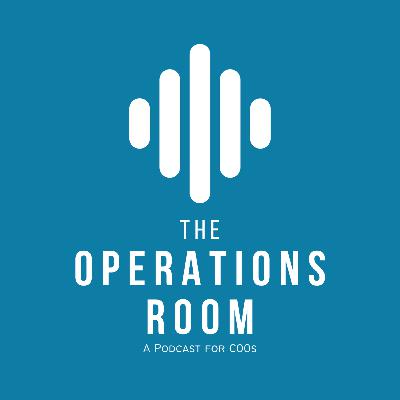
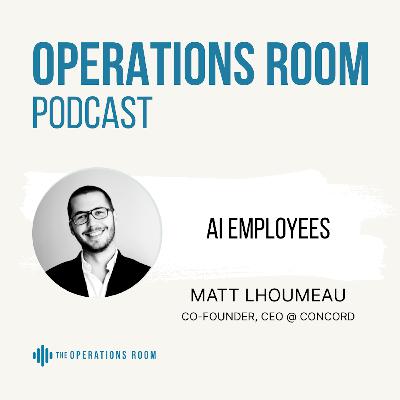
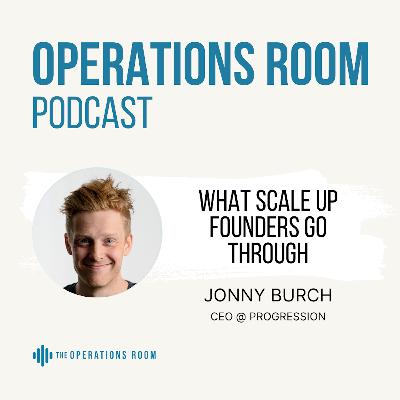

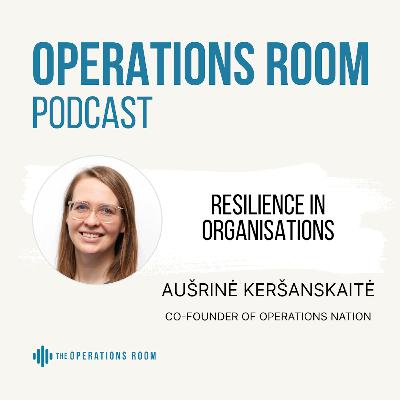
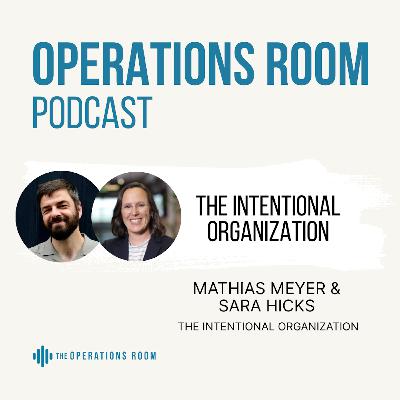
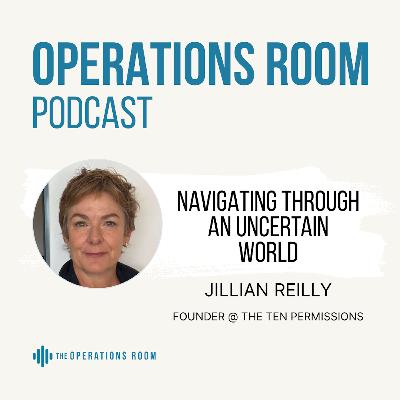
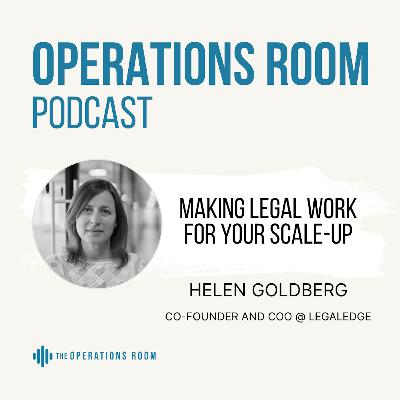

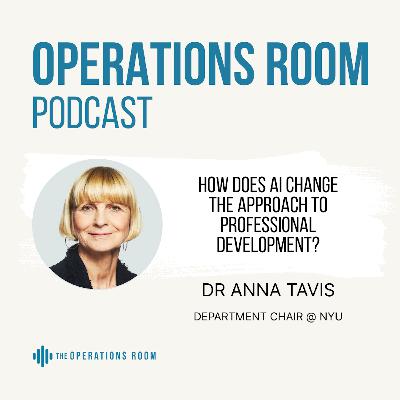
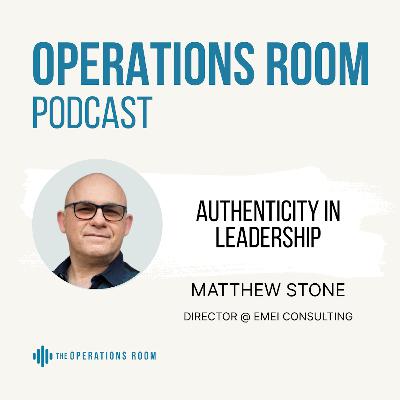



The strategic planning method is a tool that allows your team to focus on a specific element of the strategic plan. This will help your team dive into a specific stage of your plan to create a comprehensive narrative that will truly help turn ideas into actions. Moreover, this can be done in software like this https://marketplace.atlassian.com/apps/1219988/okr-board-for-jira-by-oboard